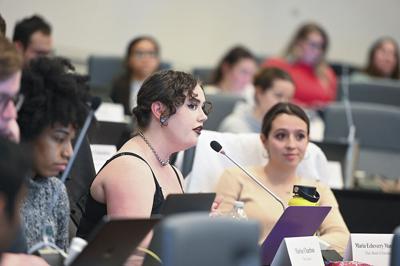Editor’s Note: This article contains references to drug use and overdose.
At his last Student Senate meeting as student body president, McKenzy Heavlin vetoed several bills, including R 106: Basic First Aid and Naloxone Training Act, which was vetoed after the meeting was over. This bill addresses accessibility to naloxone and basic first aid training for resident advisors.
The resolution was introduced March 1 by student Sen. Naila Din, a first-year studying biomedical engineering, Sen. Alyssa Price, a first-year studying genetics and former senator and Senate Body President-elect Stephen McGuinness, a third-year studying polymer and color chemistry.
Inspired by Appalachian State’s similar legislation, the bill intended to provide two doses of naloxone to RAs in every residence hall on campus. Appalachian State’s bill was supported by Din’s sister, Amarah Din, who serves as the university's student senate’s diversity and inclusion chair.
“[Appalachian State] had similar legislation that was proposed last academic year for basically the same content of providing Narcan and naloxone to resident advisors and to get the push for more accessibility for it,” Din said. “I wanted to incorporate [a bill] like this at NC State to show our support.”
The resolution was also influenced by growing accessibility standards in fraternity and sorority houses, some of which maintain their own emergency doses of naloxone.
“[We] interviewed fraternities to ask how they're able to use [Narcan] and how the University is providing it to them,” Din said. “[We wanted to] see what other areas around campus use naloxone.”
Nina Kudlak, a third-year studying political science and parks, recreation and tourism management and the former chair of the Student Affairs Committee for the Student Senate’s 102nd session, said the senators’ interest in the bill increased after a student death occurred over spring break.
“[Price] noticed that all of the fraternities had two doses of Narcan in them, which is referenced in the bill,” Kudlak said. “[Din and Price’s] personal support for this bill was strengthened by a student overdosing during spring break.”
Kudlak also said there was no debate in her committee concerning the bill. However, there were some concerns when it came to the Senate, especially regarding how RAs felt about the resolution.
“Nobody really disliked this bill,” Kudlak said. “The spirit of the bill, everybody agreed with. It was that people were concerned about the waivers and the RAs.”
Din said the purpose of including a consent form for students moving into the residence halls was to establish clarity between University policies, HIPAA regulations on medical privacy and good Samaritan laws.
“I did research on the University rules and regulations, and I found that only consenting individuals like the health service on campus are able to provide … emergency services,” Din said. “I thought that [the addition of consent forms] would be able to mitigate any discrepancies.”
With the resolution vetoed, the conversation around expanding campus accessibility to Narcan now falls on next session’s Student Senate President, McGuinness. McGuinness said this issue is one of the governing bodies’ top priorities for next academic year.
“The student body president, Timothy Reid, and I have been talking about working on that,” McGuinness said. “It is one of our biggest goals and kind of like the top priority starting off this 103rd session.”
McGuinness also said he and Din will be reworking the resolution over the summer.
“We’re gonna try to work with a lot of campus partners, including [University Student Legal Services], [University Housing] and also [Campus Health],” McGuinness said. “And also maybe changing some of the framework that might get us into various legal issues.”
With the mental health concerns on campus, McGuinness said he and his colleagues want to ensure they are not adding any stress to RAs.
“We know that RAs are already in a tough position to fill and that they have a lot on their plate,” McGuinness said. “We’re just making sure that we don't put too much on their plate, that [first aid and Narcan training] is honestly voluntary, and we're looking into how we can frame it better.”
Talks with campus partners will continue throughout the summer to fix the current concerns with the resolution. The 103rd session aims to address Narcan accessibility and training.
Are you a resident advisor or someone who’d like to comment on the resolution? Please send any information to technician-editor@ncsu.edu, technician-news@ncsu.edu or technician-opinion@ncsu.edu.
For more detailed resources concerning Narcan and naloxone accessibility, check out our recent coverage.To find the nearest pharmacy that dispenses naloxone, visit naloxonesaves.org.


(0) comments
Welcome to the discussion.
Log In
Keep it Clean. Please avoid obscene, vulgar, lewd, racist or sexually-oriented language.
PLEASE TURN OFF YOUR CAPS LOCK.
Don't Threaten. Threats of harming another person will not be tolerated.
Be Truthful. Don't knowingly lie about anyone or anything.
Be Nice. No racism, sexism or any sort of -ism that is degrading to another person.
Be Proactive. Use the 'Report' link on each comment to let us know of abusive posts.
Share with Us. We'd love to hear eyewitness accounts, the history behind an article.